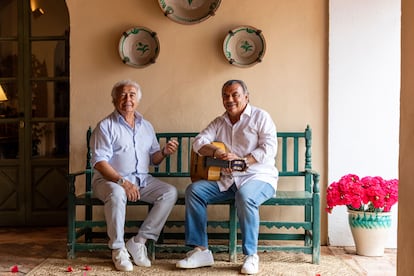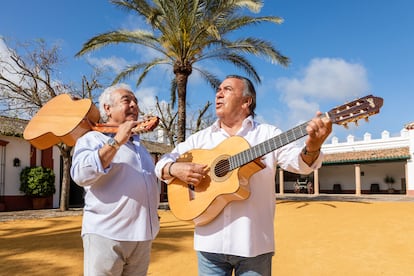The making of ‘Macarena,’ the Spanish smash hit that got the world dancing
In 1996, Antonio Romero and Rafael Ruiz shot to the top of the US charts with a remix of their song and stayed there for 14 weeks; 25 years later, they look back on the highs and lows of their runaway success


In 1996, the whole world got swept up in Macarena madness. The original flamenco hit composed by the Seville duo known as Los del Río – made up of Antonio Romero and Rafael Ruiz – had already rocketed up the charts in Spain in 1993. But the Bayside Boys’ dance remix, which incorporated female vocals in English, stayed at the top of the Billboard Hot 100 for 14 weeks that summer and remained on the charts for 66 weeks.
As the most influential music barometer in the world, it was an amazing feat for the middle-aged crooners, trumped only in 2017 by Luis Fonsi and Daddy Yankee who enlisted Justin Bieber to collaborate in a Spanglish version of Despacito, which topped the US charts for a record-breaking 16 weeks. However, no one can argue that what these two friends from the Seville town of Dos Hermanas achieved was phenomenal.
Speaking just a few words of English and with the internet still in its infancy, Los Del Río revolutionized the world’s largest and most competitive music market with their danceable ditty. The facts speak for themselves. A quarter of a century ago, Macarena was played at the Democratic National Convention with Hillary Clinton clapping along; it was also used by the US women’s gymnastics team at the Atlanta Olympics. Among other surreal achievements, the duo performed it on January 26, 1997, at the Super Bowl before a live audience of more than 70,000 spectators and tens of millions of viewers at home.
Perhaps it all got out of hand? “Not at all,” says Romero. “We never panicked because at that point we’d already had a 30-year-long career and had dealt with many, many difficulties. We started out when we were 14 and, being young, played at both singing and bullfighting. It wasn’t until our fathers died that we said to ourselves: ‘We have no choice but to take this music thing seriously.’ Basically because it was the only thing that gave us money that could help our mothers. That was the biggest sacrifice we could make.”
The duo had other hits in Spain such as Sevilla tiene un color especial or Se te nota en la mirada, but outside of Spain they are considered one-hit wonders. Not that at the age of 73, this ruffles their feathers. As Romero points out, “becoming number one on five continents is tremendously difficult. It’s not the norm. Just as Spain has only won the World Cup once, we have fortunately been able to be the world champions in terms of music. We are always being asked when we are going to compose another Macarena, to which we reply that we have already done it. Let others have a go. What we have to do now is to live and enjoy ourselves.”
While it is the anniversary of the song’s remix, it is worth remembering that the original was released on the duo’s 1993 album A mí me gusta. The catchy lyrics came to Romero when he and Ruiz were invited to a party at the end of 1992 by the businessman Gustavo Cisneros in Caracas, Venezuela, where they rubbed shoulders with the Venezuelan president at the time, Carlos Andrés Pérez, and a local flamenco dancer named Diana Patricia Cubillán Herrera.
“The young woman [Patricia Cubillán] started dancing and I told her: ‘Dale a tu cuerpo alegría, Magdalena, que tu cuerpo es pa’ darle alegría y cosa buena’ – put some joy in your body Magdalena, as your body is made to be given joy and good things.’ That’s what inspired me to write it,” says Romero. “But since I have a daughter named Esperanza Macarena, I decided to change Magdalena to Macarena.”
According to Ruiz, “She [Patricia Cubillán] has done very well out of it because, being our muse, she has been able to tell everyone that she is the real Macarena. Far from hiding her identity, we have been very open about it. We think it’s great that she has taken advantage of what happened that day to open her own dance school and get a role in a soap opera. It brings back some wonderful memories. We just hope she is doing well in Venezuela because she and her family are a delight.”
Another remix was done in the 1990s by the Spanish duo Fangoria, comprised of Alaska and Nacho Canut, before the song’s US success. They claimed they were due money and took the matter through the courts as far as Strasbourg. “When Macarena hit the big time, everyone wanted to get on board,” says Ruiz. Decades later, the Fangoria issue continues to be one they prefer not to discuss. Meanwhile, Alaska had this to say in a 2013 Vanity Fair interview: “Macarena triumphed in Spain in 1993. As Fangoria, we did a remix and that remix triumphed again in Spain. Then in Miami, suddenly, they used our remix and added some vocals. It’s not that it was a whole other remix; it was ours! That went to the European courts, but it was thrown out, so there’s nothing to be done.”
Los del Río, however, have stressed that there is no animosity towards Fangoria. While talking about the issue in 2017 on the Bertín Osborne talk show, they insisted, “We adore Alaska!”

Whatever the truth of the matter, the remix that the Bayside Boys put out as theirs flung the doors wide open to success on the other side of the pond. Producers Mike Triay and Carlos de Yarza recorded the version in 1995 with the help of vocalist Patty Alfaro. Initially, it failed to gain the approval of Los del Riós’ record label, BMG/Ariola, which even threatened to sue them. However, since it was played incessantly on radio stations like Power 96 or New York’s WKTU, the label came round, realizing it was media coverage that it couldn’t afford to forego, though the small print on the contract is completely unknown.
Even more surreal is the fact that Macarena could have become an even bigger hit than it was. Or, at least, it was on the cards when Michael Jackson expressed an interest in recording a new version with Los del Río. “He was crazy about our song and used to play it before starting his shows to warm up his audience,” says Romero. “His lawyer contacted us and told us that Miguel, as he called him, really wanted to work with us. He told us that he was on medical treatment and that when he recovered we would take things forward. That was six or eight months before he went into decline and left us. He was very excited about it, but it wasn’t to be.”
In 2016, Los del Río collaborated with the band Gente de Zona with Más Macarena. And, incredible as it may seem, in 2019 they received a call from the American rapper Tyga asking them to collaborate in the viral Ayy Macarena, which has more than 150 million views on YouTube. Romero believes Michael Jackson might have had a hand in this. “Look, I think that wherever Miguel is, as his lawyer said, he had something to do with it, like ‘maybe not with me, but certainly with someone else,’” he says.
Much has been written about whether Los del Río are millionaires thanks to the fact they came up with the flagship version of Macarena. They continue to earn an unknown amount in royalties and songwriter’s rights. When questioned about it, they attempt a graceful brush-off. But, eventually, they address the issue. “Why don’t you contact the publisher?” says Romero. “As the songwriter, they demanded that I give them 50% to sell it and boost its popularity. What should be on the table is how many people have benefited from Macarena independently of us. I don’t mean we are about to cry and feel sorry for ourselves. We have been given what I think we deserve, but that doesn’t mean that it reflects the actual reality.”
At this point, Ruiz intervenes: “Besides all that, Antonio split the proceeds 50-50 with me,” he says. “And for the first two years, we had to pay over half of the profits in taxes.”
According to Romero, “what makes us wealthy is not Macarena, it’s our families. We have wonderful children and lovely grandchildren who are already starting to come out and sing better than we do. Humility in life is what always triumphs. There is nothing more important or rich than being humble. We have learned that from our parents, who were hard workers. Regardless of how much time has gone by, we continue to have fun singing, and we do it with the same desire we had at the start – to make the world a happier place.”
Macarena is still very much alive and kicking. As if further proof were needed, Los del Río have teamed up with Airbnb and, this August, will take on the role of hosts at a rental villa in Utrera, a city in the southern province of Seville. The first four guests, who confirmed their reservation this week, will not only be welcomed by these legendary artists, they will also have access to a private karaoke room full of Spanish guitars and will even get tips from the duo on how to perfect the choreography of the famous song. “We’re also going to teach them how to make a good gazpacho,” says Romero.
“The house is not our property,” he adds. “It belongs to some friends with whom we often do a house exchange. We still don’t know who will be coming, but I assure you that they will get a very special welcome. They’re going to have a wonderful time!” It goes without saying that Macarena will be part of the experience, though guests will have to wait and see which version is rolled out.
English version by Heather Galloway.
Tu suscripción se está usando en otro dispositivo
¿Quieres añadir otro usuario a tu suscripción?
Si continúas leyendo en este dispositivo, no se podrá leer en el otro.
FlechaTu suscripción se está usando en otro dispositivo y solo puedes acceder a EL PAÍS desde un dispositivo a la vez.
Si quieres compartir tu cuenta, cambia tu suscripción a la modalidad Premium, así podrás añadir otro usuario. Cada uno accederá con su propia cuenta de email, lo que os permitirá personalizar vuestra experiencia en EL PAÍS.
¿Tienes una suscripción de empresa? Accede aquí para contratar más cuentas.
En el caso de no saber quién está usando tu cuenta, te recomendamos cambiar tu contraseña aquí.
Si decides continuar compartiendo tu cuenta, este mensaje se mostrará en tu dispositivo y en el de la otra persona que está usando tu cuenta de forma indefinida, afectando a tu experiencia de lectura. Puedes consultar aquí los términos y condiciones de la suscripción digital.








































